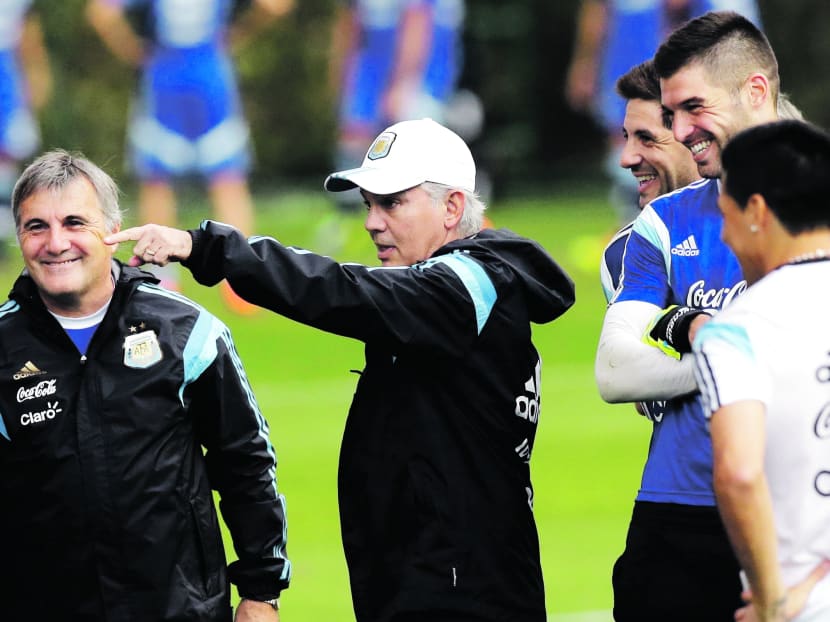Germans have advantage: Sabella
Only superficially has football hurtled back to 1986 and 1990 when Argentina and (West) Germany last played each other in World Cup finals. The punkish Diego Maradona is history.

Sabella (centre) has great admiration for Germany’s teamwork and tactical powers. PHOTO: AP
Only superficially has football hurtled back to 1986 and 1990 when Argentina and (West) Germany last played each other in World Cup finals. The punkish Diego Maradona is history.
Mechanical German football is dead. There is no reason to fear a chess match this weekend.
The exhilarating football of this World Cup group stage has been packed away now, as the heavyweights circle each other, looking to time the perfect knockout blow. But this tournament has moved to a higher level of combat with its own intricacies and a powerful appeal.
However cagey the Argentina-Netherlands match was, the final cannot fail to fascinate, with the array of German talent on show, or with Lionel Messi plotting to deepen Brazil’s misery on the sacred turf of the Maracana.
Undeniably they are worthy finalists in a competition that has treated us to every footballing scenario from biting and a superstar’s broken back to a 7-1 semi-final massacre of the most successful nation in history.
Alejandro Sabella, the Argentina coach, said: “I have great admiration for two countries from a football point of view: Brazil and Germany. The Germans have always shown physical might, tactical powers, mental force and have always had the players with a certain South American touch.
“(Felix) Magath, (Lothar) Matthaus, (Franz) Beckenbauer obviously ... (Gunter) Netzer, (Paul) Breitner ... Now they have the option of naturalising foreigners, like Ilkay Gundogan, that has added to their style.
“They know what teamwork is. They have been planning for a long time. They know about organisation. The final is extremely difficult.
“In 1998 we beat England in extra-time and lost against Holland in the heat of Marseille, and it harmed us. We’ll see if it’s a minor issue — the fact we played extra-time and the Germany game was decided in the first 45 minutes, so they could ease off in the second half, whereas we had to spend every last drop of sweat to reach the World Cup final.”
German fluency and Argentine toughness are at the heart of this re-match of the 1986 final won by Maradona’s team and the 1990 game when West Germany took revenge.
To beat Germany, Sabella will need bursts of magic from Messi, on whom intense pressure will settle. Trying to find space amid Germany’s midfield block of Bastian Schweinsteiger, Toni Kroos and Sami Khedira will test even Messi’s dancing skills, especially if Angel di Maria fails to recover from his thigh injury. All the signs point to a German victory: The first for a European team in Latin America.
“Some of my players are sore, beaten, tired — the result of a ‘war’,” said Sabella. “We’ve made the story. We’ve made it into the final. I don’t know what we’ve crossed, but it’s a line of no return. It was exhausting for my players, covering the spaces between the forwards and the midfield, but they did it really well.”
In the other corner, Germany were trying to block off complacency. While Argentina cultivate their yard-dog image — and enjoy Brazil’s humiliation — Joachim Low’s team are 90 minutes away from a torrent of praise. The world will bow to German planning, German intelligence, German maturity and vibrant German talent.
It defies belief that they were being criticised mid-tournament for supposedly losing their way. At no point on the road to the final did Low’s men deviate from their urge to press the opposition with a hugely impressive array of players, backed up by a strong bench.
The clue was in Germany’s destruction of Portugal, 4-0, which too many ascribed to Portuguese weakness. German pressure blew their valves. Same outcome in the Brazil-Germany semi-final.
Sabella was asked about these German onslaughts. “You’re scaring me,” he said. “You want to instil fear?” THE DAILY TELEGRAPH
Paul Hayward is the chief sports writer at the Daily Telegraph





